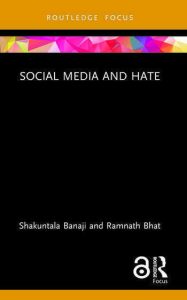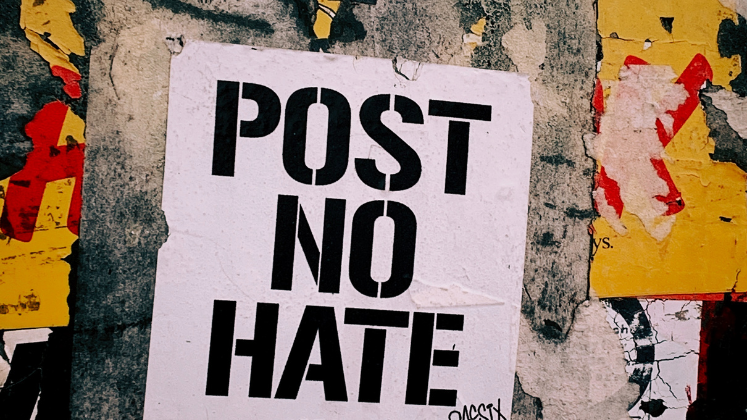In Social Media and Hate, Shakuntala Banaji and Ramnath Bhat explore the problem of hate speech on social media platforms, offering case studies of India, Brazil, Myanmar and the UK. The book is a timely and insightful exploration of the intersection of misinformation and social media hate in contemporary societies, writes Deshdeep Dhankhar.
If you are interested in Social Media and Hate, you can watch a video or listen to a podcast of the authors discussing the book as part of an LSE public event, recorded on 25 October 2022.
Social Media and Hate. Shakuntala Banaji and Ramnath Bhat. Routledge. 2022.
 In today’s digital age, social media platforms have become integral to our lives. They have transformed the way we interact, communicate and consume information. However, social media platforms have also become breeding grounds for hate speech and misinformation.
In today’s digital age, social media platforms have become integral to our lives. They have transformed the way we interact, communicate and consume information. However, social media platforms have also become breeding grounds for hate speech and misinformation.
Shakuntala Banaji and Ramnath Bhat provide an overview of the problem of hate speech on social media platforms. Social Media and Hate endeavours to explain the multiple challenges arising from the anonymity and velocity of communication on social media platforms, which facilitate the rampant proliferation of hate speech. This open-access study also discusses the concept of social media literacy, arguing that individuals must be able to navigate the complex landscape of social media and resist the spread of hate speech.
The book argues that social media hate is not a new phenomenon. However, it has been enabled through the affordances of social media platforms, such as anonymity, virality and the ability to connect with like-minded individuals. The research presents a bold proposition: namely, that social media hate and the consequential extreme violence and discrimination often directed towards specific communities are inextricably tied to the complex socio-political conditions and behaviours that users exhibit on major social media platforms. Facebook, TikTok, ShareChat, Instagram and WhatsApp, among others, are all implicated in this complex web of social dynamics.
The book presents a cogent and highly sophisticated theoretical discussion of the practices and consequences of sectarian hatred. The analysis draws on both quantitative and qualitative literature, and is augmented by four exceptional qualitative case studies that provide a wealth of illuminating observations on the scourge of social media hate in India, Brazil, Myanmar and the UK. These case studies delve deep into the technical, ideological and networked connections that underpin social media hate, specifically as they pertain to various marginalised groups across these four distinct contexts.

Photo by Jon Tyson on Unsplash
Importantly, the study categorises ‘typologies of hate’ in different forms of communication and identifies certain groups as being more likely to be perpetrators or targets of hate speech; Muslims, Dalits, migrants, dissenters and feminists are in the latter category, among others. It also notes that there are other types of uncivil speech that may not strictly fall under hate speech but can still reinforce marginalisation or spill over into toxic or hateful speech. Together, these findings and insights contribute to a comprehensive understanding of the complex dynamics of social media hate, and the interplay between socio-political factors and online behaviours.
The authors explore the failure of hate-speech policies and procedures in the case of the Rohingya in Myanmar. The study shows how social media hate against the Rohingya is enabled by the broader political and social context of ethnic conflict and discrimination. They argue that the failure of policies and procedures highlights the need for a more nuanced approach to addressing hate speech that considers the political and historical context in which it occurs.
Similarly, in the case study of Brazil, the authors explore the relationship between Brazil’s history of colonisation and violent ‘othering’ and contemporary online hate speech. They describe how online hate speech in Brazil often targets historically marginalised groups, including Indigenous peoples and Afro-Brazilians. The authors call for greater focus on addressing historical injustices to combat contemporary hate speech.
Banaji and Bhat explain social media’s role in perpetuating hierarchies of hate in India, particularly around issues of caste and religion. The authors describe how hate speech on social media has contributed to violence against marginalised communities in India. They highlight the role of socio-political contexts, values and behaviours in enabling social media hate. For example, the authors show how hate speech and violence against Muslims in India are encouraged by the Hindu nationalist agenda of the ruling party, the BJP, and how social media platforms have become key sites for disseminating hate speech against Muslims.
They also analyse the challenges of regulating hate speech on social media in the Indian context, arguing that social media platforms are responsible for addressing this issue. The government has issued regulations for intermediaries to manage user complaints, but it retains the authority to make conclusive decisions if internal mechanisms fail. Additionally, the government has urged companies to break encryption in messaging apps, supposedly to trace disinformation sources but in reality to monitor and detain critics of the regime.
The authors also explain the intersectional dynamics of hate speech in the UK, focusing on the role of white male rage online. They describe how hate speech is often rooted in intersecting forms of oppression, including racism, misogyny and homophobia. The authors argue that addressing hate speech online requires a greater understanding of these intersecting dynamics and a more intersectional approach to policy and practice. Across the book, the cross-country and intersectional case studies highlight the devastating effects of social media hate on individuals and communities, grounding the theoretical discussion in real-world examples.
The authors argue that similarities between the case studies underscore the need for a systematic political response to social media hate that recognises its complex and interconnected nature. The authors suggest that such a response should involve a combination of regulatory measures, educational initiatives and community-based interventions. These include the use of ethical AI, media education and fact-checking as well as individual actions like blocking specific accounts that engage in hate speech or discriminatory behaviour on social media or undertaking therapy, which can be a helpful resource for those who have been impacted by social media hate. However, long-term solutions require international efforts towards social and economic change through social movements, strikes and boycotts.
Banaji and Bhat’s Social Media and Hate is a timely and insightful exploration of the intersection of misinformation and social media hate in contemporary societies. Overall, the book is a comprehensive and thought-provoking analysis of the complex relationship between social media and hate speech and will be of interest to scholars, policymakers and activists alike.
Note: This review gives the views of the author, and not the position of the LSE Review of Books blog, or of the London School of Economics and Political Science.






